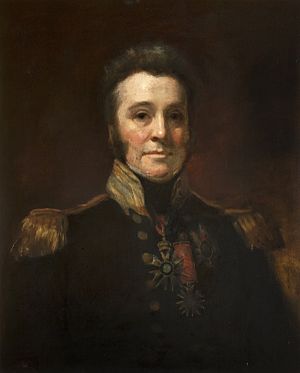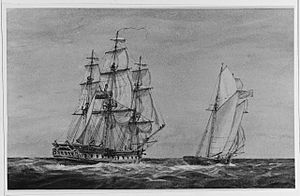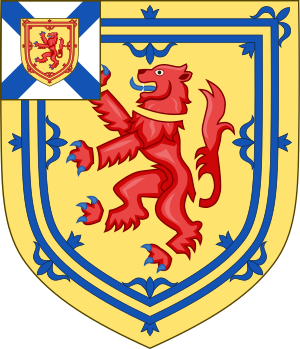Anthony Maitland, 10th Earl of Lauderdale facts for kids
Quick facts for kids
The Earl of Lauderdale
|
|
|---|---|

Anthony Maitland, 10th Earl of Lauderdale, by Colvin Smith
|
|
| Born | 10 June 1785 |
| Died | March 22, 1863 (aged 77) |
| Allegiance | |
| Service/ |
|
| Rank | Admiral of the Red |
| Commands held | HMS Arrogant HMS Pique HMS Glasgow |
| Battles/wars | French Revolutionary War Napoleonic Wars War of 1812 Bombardment of Algiers |
| Awards | Knight Grand Cross of the Order of the Bath Knight Commander of the Order of St Michael and St George |
Anthony Maitland (born June 10, 1785 – died March 22, 1863) was a brave British naval officer. He became an Admiral in the Royal Navy. He fought in several big wars, including the French Revolutionary War, the Napoleonic Wars, and the War of 1812. He also took part in the Bombardment of Algiers.
Besides his naval career, Anthony Maitland was also a Member of Parliament. This means he helped make laws for the country. He represented areas like Haddington Burghs and Berwickshire. He also served as a special helper, called an aide-de-camp, to King William IV and later Queen Victoria.
Contents
Early Life of Anthony Maitland
Anthony Maitland was born on June 10, 1785. He was the second son of James Maitland, 8th Earl of Lauderdale. His mother was Eleanor Todd.
Starting His Sea Career
Anthony Maitland joined the Royal Navy when he was just 10 years old, on October 2, 1795. His first ship was the famous ship-of-the-line HMS Victory. This ship was the main ship, or flagship, of Admiral Sir John Jervis. They sailed in the Mediterranean Fleet.
In October 1798, Anthony became a midshipman. This was a rank for young officers learning the ropes. He stayed with Admiral Jervis on another ship called HMS Ville de Paris. Later, in 1801, he moved to a faster ship called a frigate, HMS Triton.
A Brave Fight and Injury
While on the frigate HMS Medusa, Anthony showed great courage. On August 15, 1801, his ship's boats tried to attack the French Boulogne Flotilla at night. The French were ready for them. Anthony was badly hurt during this fight. His ship, Medusa, had the most injuries of any ship in the squadron.
After recovering, Anthony continued his service. In 1804, he became an acting lieutenant on the brig-sloop HMS Childers. He was officially made a lieutenant in 1805. He then joined HMS Blenheim in the East Indies. In May 1806, he was promoted to commander. He took charge of HMS Arrogant, an older ship used as a guard ship in Bombay.
Becoming a Post-Captain
Anthony Maitland became a post-captain on September 25, 1806. This was a very important rank. His next command was the frigate HMS Pique in 1811. With Pique, he traveled to many places, including Lisbon, South America, and Jamaica.
During the War of 1812, Maitland and Pique were off the coast of America. In August 1813, they successfully captured an American privateer called Hawk. A privateer was a private ship allowed to attack enemy ships. Hawk surrendered without a fight.
The Bombardment of Algiers
In 1816, Anthony Maitland took command of the large frigate HMS Glasgow. He joined a fleet led by Admiral Sir Edward Pellew. Their mission was to attack Algiers. On August 27, the fleet began the Bombardment of Algiers.
Glasgow was positioned between two other ships, firing at the town's gun batteries. When another ship, HMS Impregnable, was badly damaged, Maitland bravely tried to move Glasgow to draw enemy fire away from it. The winds made this very hard. Glasgow suffered a lot of damage, with ten men killed and thirty-seven wounded. For his bravery, Maitland received an award called the Companion of the Order of the Bath.
After repairs, Glasgow sailed to the Mediterranean Sea. Maitland served there until 1821. In 1820, he received another award, Knight Commander of the Order of St Michael and St George. In 1830, he became a naval aide-de-camp to King William IV, and later to Queen Victoria.
Rising to Admiral
Anthony Maitland was promoted to rear-admiral on November 23, 1841. He continued to rise through the ranks. He became a vice-admiral in 1851 and finally an Admiral in 1857. In 1862, he received the highest honor, Knight Grand Cross of the Order of the Bath. He died as an admiral of the red, which was a very senior rank. He never served at sea as an admiral.
Maitland's Political Life
Besides his naval career, Anthony Maitland also served as a Member of Parliament. He represented Haddington Burghs from 1813 to 1818. Later, he represented Berwickshire from 1826 to 1832. These were areas traditionally linked to his family. In Parliament, he often voted with the opposition party.
In 1860, Anthony Maitland became the Earl of Lauderdale after his older brother, James, passed away. This allowed him to sit in the House of Lords, which is part of the British Parliament. When he died, his Scottish titles went to his cousin, Thomas Maitland.
His Final Years
Anthony Maitland passed away on March 22, 1863. He never married.
Family Connections
Anthony Maitland came from a family with strong ties to the military. His uncle was Lieutenant-General Sir Thomas Maitland, who was a governor in places like Malta. Many other family members, including his cousin and successor as earl, Admiral Sir Thomas Maitland, also served in the navy.
 | Aurelia Browder |
 | Nannie Helen Burroughs |
 | Michelle Alexander |



